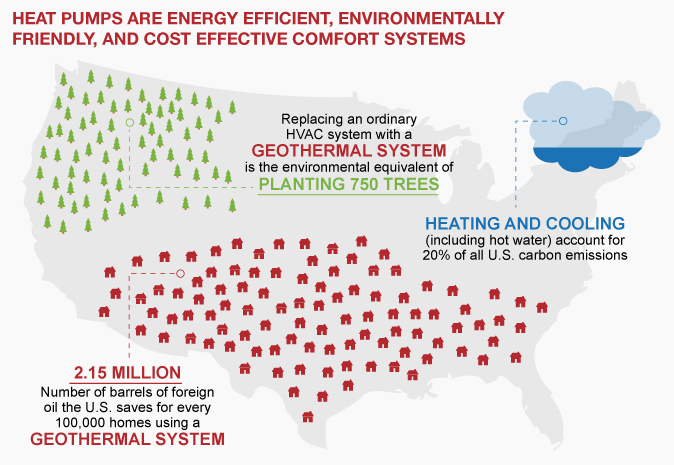Residential Renewable Energy Resources
Are you considering updating your home’s HVAC system to something a little more eco-friendly? Some residential units run on renewable energy to heat and cool a home. This means the energy source is not depleted when it is used. Green HVAC systems can keep your residential space climate-controlled without burning fuel or emitting greenhouse gases. The following are some of the most popular residential renewable energy HVAC systems.
Solar-Powered Residential Water Heaters
The sun provides the best source of renewable energy. Solar power is constant and infinitely abundant. Solar-powered water heating systems use solar panels to generate hot water in your home and can be used in any climate. Most residential solar water heaters will require a well-insulated storage tank. However, after the tank is purchased and installed in your home, the energy (sunshine) is free!
Geothermal & Dual-Fuel Heat Pumps
Geothermal HVAC systems use renewable energy that works with nature, not against it. In the winter, underground pipes circulate water that absorbs the earth’s heat and returns it to the indoor heat pump. The pump extracts the heat and distributes warm air throughout your home. In the summer, the heat pump removes heat from your home leaving only cool air to be distributed through the vents. The extracted heat is then re-injected into the underground pipes.

Thermally-Driven Residential Air Conditioning
Thermally-driven cooling units offer a cost-effective alternative to traditional residential air conditioners. The units use solar energy that can be supplemented with natural gas if it runs short in the winter. Thermally-driven residential air conditioning provides more efficient cooling than most electric systems and reduces electricity bills for your home.
Benefits of Renewable Energy Resources
- Improved energy efficiency
- Lower utility bills
- Increased home value
- Tax credits and government incentives
- Reduced risk of malfunction
- Eliminated environmental impact
- Eliminated risk of carbon monoxide poisoning
Residential Renewable Energy Tips & Resources
Before deciding to switch to a renewable energy source for your home, you’ll want to assess your electricity needs. This will help you figure out how big of a unit you’ll need as well as how your energy use fluctuates throughout the year.
Next, you’ll want to research your state and neighborhood’s codes and regulations for installing a renewable energy system in your home. The State of Oregon supports most at-home energy efficient devices and offers residential energy tax credits.
When you’re ready to choose a renewable HVAC system for your home, it’s important to get to know the available green technology options. Each type of renewable source has certain costs, availability, and maintenance needs to take into consideration.
Energy.gov is a great resource to learn more about at-home renewable energy systems. Oregon.gov will give you a better idea of local and state regulations and incentives on renewable energy systems.
Residential Renewable Energy FAQs
How big of a solar collector area do I need on my home?
This depends on the amount of hot water your household uses on a daily basis, the type and orientation of the solar collectors, and where you live.
Do solar water heaters only work in hot climates?
Solar water heaters can be used in any climate but they work best in regions where it rarely freezes. This makes the Pacific Northwest a prime location for solar water heaters.
How many solar panels do I need?
For a typical single-family residence, you will need one to two solar collector panels on your roof.
What size solar water heater do I need?
Since solar water heaters store hot water in a tank, a larger tank will allow you to go longer without recharging the water with heat from the sun. This is important in cities like Portland that have frequent rain and overcast skies.
For more information on installing a solar water heater or other renewable energy source in your Portland home, contact us at AAA Heating & Cooling today!